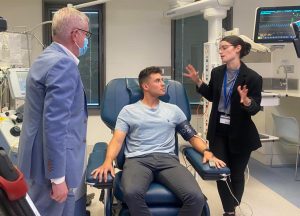Testosterone treatment in addition to a diet and exercise program has shown significant benefits for men who are at high risk of type 2 diabetes (T2D) or with mild newly diagnosed T2D.
The Testosterone for the Prevention of Type 2 Diabetes (T4DM) Study is the first large-scale, placebo-controlled randomised trial assessing testosterone treatment for preventing or reversing type 2 diabetes in men.
Participants who received intramuscular testosterone injections every three months were 40 per cent less likely to have type 2 diabetes at the two-year mark, compared to the placebo group.
Shedding new light
Lessons from the MAILES study, an ongoing long-term study of male health in South Australia, have shown that obesity is associated with low testosterone concentration in the blood. In men who are overweight or obese, having a low blood testosterone level significantly increases the risk of subsequently developing type 2 diabetes.
“Normally, blood testosterone levels should not decrease as a result of increasing age. Rather, it’s got to do with obesity and the health issues that parallel age,” said primary investigator Professor Gary Wittert, Senior Consultant Endocrinologist at the Royal Adelaide Hospital and Director of the Freemasons Centre for Male Health and Wellbeing based at the South Australian Health and Medical Research Institute.
Weight loss through diet and exercise prevents T2D and increases blood testosterone. However, it was not previously known whether testosterone has any benefit over and above a diet and exercise program.
“It’s hard to lose weight and maintain that weight loss, so we wondered whether treatment with testosterone would help,” said Professor Wittert.
The T4DM trial randomly assigned 1007 overweight or obese men aged 50–74 years with impaired glucose tolerance or newly diagnosed type 2 diabetes to testosterone treatment or a placebo. Both groups participated in a diet and exercise modification programme.
Treatment with testosterone reduced the risk of type 2 diabetes at 2 years by 40 per cent, over and above the effect of the lifestyle programme.
The treatment group also experienced greater increases in muscle mass, grip strength, and sexual function.
However, some of these additional benefits varied between the men. So, while the trials show positive results in terms of diabetes management, the researchers consider it premature to advocate for the widespread use of testosterone for diabetes prevention in men.
“We’re still trying to work out which men benefit the most from testosterone,” said Professor Wittert.
Additional work is also needed to fully understand potential adverse effects of testosterone treatment, such as increase in red blood cell count that occurred in six per cent of the men, which can have implications on cardiovascular health.
The power of prevention
While the group of men who received testosterones in addition to the diet and exercise programme experienced the greatest change in diabetes risk and other benefits, the lifestyle modification itself was significant.
“What we know for sure is that T2DM is a disease that is preventable, but the risk should be recognised early and then appropriate interventions put in place,” said Professor Wittert.
At two years, glucose tolerance normalised in 43 per cent of the men who underwent lifestyle modification.
“To see this result, from a very simple community-based relatively inexpensive lifestyle program, sends a powerful message about preventing diabetes in men,” Professor Wittert said.
“I think that’s one of the major take-home messages of this work.”
A holistic approach to male health needed
Although testosterone treatment shows positive effects for overweight men at risk of T2DM, Professor Wittert stressed the need for a holistic view of men’s health to manage co-existing health conditions that go undetected.
“What we want health care professionals to be do is to find out about the comorbidities and ask men about their problems, including being alert to the issues such as depression, obstructive sleep apnoea, sexual problems, and lower urinary tract symptoms. These are all surprisingly common and men want to be asked about them” he said.
“We need to deal with everything, implement a lifestyle modification programme, and then consider a medication if that’s not coming together, but it’s not the first port of call.”



